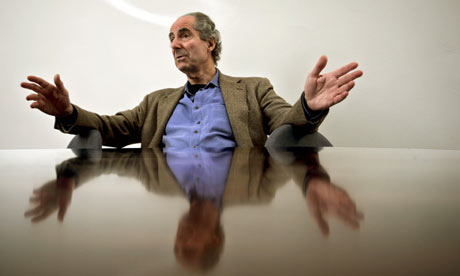
Guardian Books
It's sobering to think about how small the world of American letters will look without him
He's just published a new novel, and another is finished and due for publication next year, but the memorialisation of Philip Roth has already begun. The towering American novelist has recently had his works published by the Library of America, giving him an immortal status usually reserved for dead authors. At age 76, his birthdays are now "commemorated" rather than celebrated, with his achievements discussed by awestruck admirers. And Roth himself has been batting off curious journalists probing into his recent meditations on death in The Dying Animal, Everyman and Exit Ghost – are these novels an attempt to come to terms with his own mortality, they ask?But in a sense, those aren't the most interesting questions. Many writers turn instinctively in their later years to the bewilderments of old age. Among Roth's contemporaries, Saul Bellow dealt with the humiliations of dying in his final novel Ravelstein; while John Updike's Seek My Face was as much concerned with ageing as art history. In Roth's case, this shift resulted in one of his best novels. Devoid of the humour which usually leavens his narrators, the stripped down and deadly serious voice in Everyman was dense, lyrical and overwhelmingly powerful.
And this points to the more urgent question that will crop up increasingly in coming years. Despite Roth wanting to have them all shot, critics will be asking: can we imagine a world without Roth? "I can't see an American writer coming along who is replacing Roth," says Jay Prosser, who teaches American literature at the University of Leeds. "He writes with his ear – his novels are completely driven by his voice." There is a singularity of voice in Roth's work which is hard to find elsewhere. The current crop of high-profile American writers – such as Dave Eggers, Jonathan Safran Foer and the late David Foster Wallace – have raised technicality to an art form, but it would be hard to argue that they drive their novels home with the same ferocious intensity.
And a piece of American history will also fall into the sea when Roth goes. Now the last one standing from the big-hitting male American writers who shot to fame alongside him, Roth came of age when writing the Great American Novel was still an embodiment of the American dream. Tom Wolfe wrote in 1972 that the novel was "one of the last of those superstrokes, like finding gold, through which an American could, overnight, utterly tranform his destiny".
Now that novels have to compete in the attention economy along with everything else, younger American writers have found themselves emerging on lower pedestals. David Foster Wallace argued in the 1990s that American fiction writers under 40 operate in a media-saturated realm which separates them from the likes of Roth, Updike and Bellow. It could well be that American novelists never again achieve the same level of mythology as Roth.
And this points to the more urgent question that will crop up increasingly in coming years. Despite Roth wanting to have them all shot, critics will be asking: can we imagine a world without Roth? "I can't see an American writer coming along who is replacing Roth," says Jay Prosser, who teaches American literature at the University of Leeds. "He writes with his ear – his novels are completely driven by his voice." There is a singularity of voice in Roth's work which is hard to find elsewhere. The current crop of high-profile American writers – such as Dave Eggers, Jonathan Safran Foer and the late David Foster Wallace – have raised technicality to an art form, but it would be hard to argue that they drive their novels home with the same ferocious intensity.
And a piece of American history will also fall into the sea when Roth goes. Now the last one standing from the big-hitting male American writers who shot to fame alongside him, Roth came of age when writing the Great American Novel was still an embodiment of the American dream. Tom Wolfe wrote in 1972 that the novel was "one of the last of those superstrokes, like finding gold, through which an American could, overnight, utterly tranform his destiny".
Now that novels have to compete in the attention economy along with everything else, younger American writers have found themselves emerging on lower pedestals. David Foster Wallace argued in the 1990s that American fiction writers under 40 operate in a media-saturated realm which separates them from the likes of Roth, Updike and Bellow. It could well be that American novelists never again achieve the same level of mythology as Roth.

Nenhum comentário:
Postar um comentário